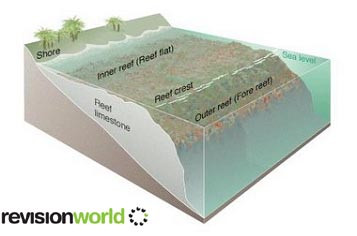Coral Reefs
Coral reefs are among the most diverse and productive communities on Earth.
They are found in the warm, clear, shallow waters of tropical oceans worldwide.
Reefs are formed from calcium carbonate produced by tiny coral polyps.
Reefs have functions ranging from providing food and shelter to fish and invertebrates to protecting the shore from erosion.
Revenue from tourists attracted to the beauty of coral reefs can be a significant source of income for human communities in these areas.

Corals and coral reefs are extremely sensitive.
Slight changes in the reef environment may have detrimental effects on the health of entire coral colonies.
These changes may be due to a variety of factors, but they generally fall within two categories: natural disturbances and anthropogenic disturbances.
Although natural disturbances may cause severe changes in coral communities, anthropogenic disturbances have been linked to the vast majority of decreases in coral cover and general colony health when coral reefs and humans occur together.
Discharge from power plants and sewage works alter the sea temperature and the amount of nutrients in the water.
Agriculture, particularly where soil erosion is a problem, decreases the amount of light reaching the coral due to increased sedimentation.
Overfishing by humans has altered the food chain.
The collection of coral for tourist souvenirs has damaged many reefs.
